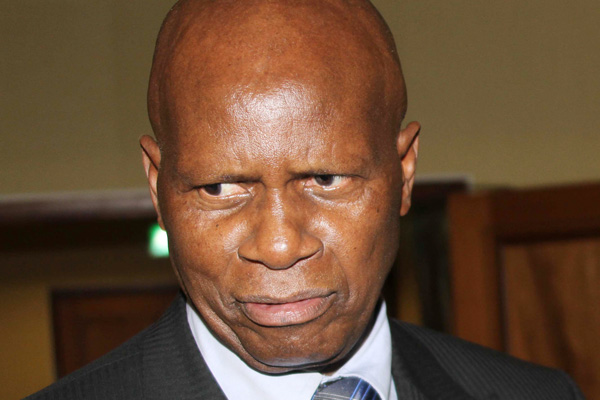
l Finance minister shields banks
Finance minister Patrick Chinamasa has stated that foreign banks operating in Zimbabwe have complied with the country’s indigenisation law, a statement representing a public rejection of Indigenisation minister Patrick Zhuwao’s crude treatment of the sensitive financial services sector.
BY VICTORIA MTOMBA
Zhuwao has been threatening foreign-owned companies — including banks — with closure, claiming they had missed the March deadline to cede 51% of their shares to locals.
Last week, President Robert Mugabe’s nephew reacted angrily to statements by Reserve Bank of Zimbabwe governor John Mangudya, who insisted that banks were complying with the indigenisation law.
Chinamasa entered the fray yesterday, taking the unusual step of issuing a statement to set the record straight on the status of the foreign-owned banks that form the backbone of Zimbabwe’s fragile economy.
“I am pleased to announce that all the affected foreign-owned financial institutions operating in Zimbabwe, namely Barclays Bank, Stanbic, Old Mutual and CABS, Standard Charted Bank, Ecobank, BancABC (as well as) MBCA Bank, have submitted credible indigenisation and economic empowerment plans before the deadline of March 31 2016, in line with policy and the notice gazetted by the minister of Indiginisation, Youth and Economic Empowerment,” reads part of Chinamasa’s statement.
- Chamisa under fire over US$120K donation
- Mavhunga puts DeMbare into Chibuku quarterfinals
- Pension funds bet on Cabora Bassa oilfields
- Councils defy govt fire tender directive
Keep Reading
“The indigenisation plans so submitted are promotive of socially and economically desirable objectives and goals as set out in the gazetted indigenisation frameworks.
“The submitted plans are consistent with the letter and spirit of the Indigenisation and Economic Empowerment Act and in line with the aspirations of both ZimAsset and the 10 point economic plan,” the minister added.
Chinamasa and Mangudya late last year tried to put brakes to Zhuwao’s crusade to force foreign-owned companies to comply with the controversial law that has spooked investors and reduced confidence in Zimbabwe’s economy.
Zhuwao told journalists in Harare that Mangudya’s statements that foreign-owned banks had complied with the government directives on indigenisation were incorrect.
According to sources, the banks have proposed to give locals a stake in their businesses through share ownership schemes and empowerment credits.
“Banks will comply through a combination of indigenising between 20% to 25% via employee ownership schemes and by adhering to the socially and economically desirable financial objectives as provided for in the Indigenisation and Empowerment General Regulations of 2010 section 5 (4) which allow for a lesser share of 51% in lieu of empowerment quotas or credits that include employment creation, technology transfer, value addition and any other economically acceptable consideration,” a senior government official said.
The official added that: “It is also understood that after five years, it is not possible to cement the credits into ownership as that becomes double dipping and the country will be unable to wind exposures to these segments of society.
“This means that, for instance loans that have been availed to youth and women by banks, in some cases they would have managed to pay them back during that period.”
Meanwhile, National Indigenisation and Economic Empowerment Board CEO, Wilson Gwatiringa on Friday said they were not in a position to say how many companies had complied with the indigenisation law by Zhuwao’s Thursday deadline.
Gwatiringa said the Zimbabwe Investment Authority and line ministries were still assessing the applications by companies.
“Right now we are focusing on serving clients. Our compliance department is fully serving clients and we are not yet looking at figures,” he said.
“We may be able to give you the figures next week. It is not just us involved but Zimbabwe Investment Authority and line ministries as well.”
Zhuwao said it was now up to line ministries to ensure that companies that were under their portfolios complied with the law.
“My specific approach was to make people aware of the law. I have now left things with the line ministers who will implement the law,” he said.
“The line ministers are responsible for compliance. I cannot ask them how far they are as that will be distracting them from work.”
Mugabe signed the Indigenisation and Empowerment Bill into law in 2008 but a serious push to implement it only began after Zhuwao’s appointment last year.












